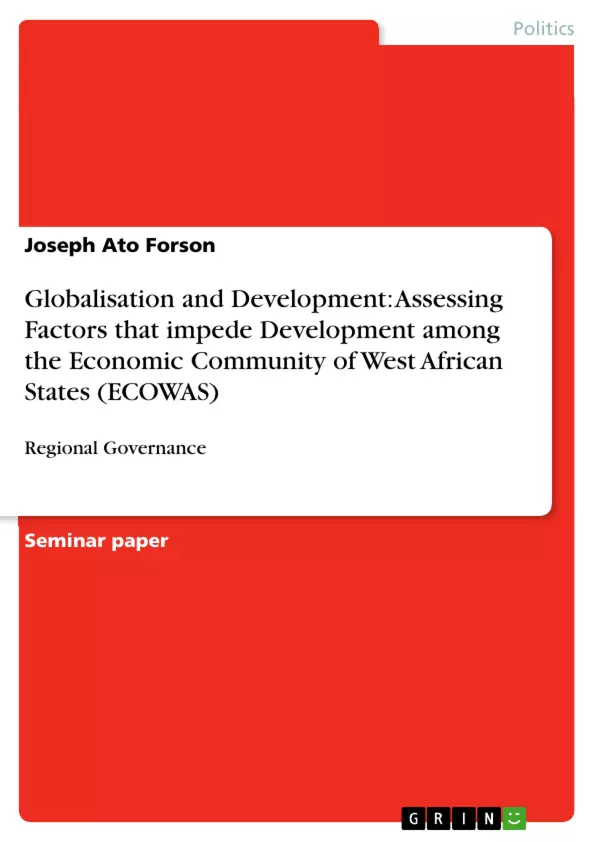In this paper, there is an attempt to assess factors that pose as impediments to the creation of an effective regional block to maximize some of the benefits embedded in integrating regional economies to foster development in West Africa. For the past four decades, West Africa has been experimenting regional economic integration but progress has been slow and without significant results. Thus, there is a need for a more favorable environment for overall trade. The potential of ECOWAS in exploiting economies of scale and enhancing competition has been limited by a number of impediments such as trans-border movement, lack of monetary union, political divide especially with francophone countries still holding allegiance to France under the system of assimilation, protection of market by bigger States (protectionism), lack of institutional framework to champion the cause of economic integration and instability posing as security threat among other factors. Analysts have suggested adopting and replicating the EU model holds the key to overcome these impediments. A critical assessment of the EU model is made to ascertain which aspects of the EU model are adoptable and implementable for ECOWAS to be fully operational to bring about desired economic progress and development. However, the current EU crisis has given analysts a lot to think about and any other regional body (like ASEAN) that desires to pursue full integration. Currently, there are signs to show that some members want to secede from the union either voluntarily or by coercion. On the basis of this development, we outline certain measures as recommendations for ECOWAS.
Inhaltsverzeichnis (Table of Contents)
- SECTION A: GENERAL OVERVIEW
- 1.1 Introduction
- 1.2 Rationale of this Study
- 1.3 Study Objectives
- 1.4 Scope, Methodology and Data Collection of this paper
- 1.5 Organization of the Paper
- SECTION B: GLOBALISATION AND REGIONAL INTEGRATION: A RECIPE FOR DEVELOPMENT FOR ECOWAS MEMBER STATES
- 2.1 What is globalization and Regional Integration?
- 2.1.1 ECOWAS Regional Integration Model
- 2.1.2. Revival of Interest in Regional Integration in West Africa
- 2.2 What Factors Impedes Development among ECOWAS Member States
- 2.2.1 Challenges of Effective Integration among ECOWAS member States
- 2.2.2 What have been the Consequences of these impediments to ECOWAS and SSA Development?
- SECTION C: OVERCOMING THESE IMPEDIMENTS: LEARNING FROM THE EUROPEAN UNION MODEL AND A SNAPSHOT OF THE BENEFITS
- 3.1 The EU model in Perspective
- 3.1.1 Political will and leadership, not just institutions matter
- 3.1.2 The need to be strategically selective and to sequence
- 3.1.3 Diversity and identity
- 3.1.4 Monetary union
- 3.1.5 Bringing the people along
- 3.2 Benefits of Regional Integration to the Development of ECOWAS member states?
- 3.2.1 Intra ECOWAS Community Trade
- SECTION D: RECOMMENDATIONS AND CONCLUSION
Zielsetzung und Themenschwerpunkte (Objectives and Key Themes)
This study aims to assess factors that impede the development of an effective regional block within the Economic Community of West African States (ECOWAS), particularly those factors that inhibit the maximization of benefits from integrating regional economies. The focus is on understanding the challenges of regional integration in West Africa and exploring potential solutions for economic progress and development.
- Globalization and Regional Integration in West Africa
- Factors Impeding Development in ECOWAS
- The European Union Model as a potential solution
- Benefits of Regional Integration to ECOWAS Member States
- Recommendations for Overcoming Impediments to Development
Zusammenfassung der Kapitel (Chapter Summaries)
This study begins by presenting an overview of the global trend in development and the increasing significance of globalization. It introduces the concept of globalization and its impact on the integration of national economies. The study then focuses on the Economic Community of West African States (ECOWAS), discussing its establishment, objectives, and challenges to effective regional integration. It examines various factors that impede development among ECOWAS member states, including trans-border movement, lack of monetary union, political divisions, and protectionism.
The study then explores the European Union (EU) model as a potential solution for overcoming these challenges. It analyzes the key aspects of the EU model, particularly political will, strategic selection, diversity and identity, monetary union, and public engagement. Finally, the study discusses the benefits of regional integration for ECOWAS member states, specifically focusing on intra-ECOWAS community trade.
Schlüsselwörter (Keywords)
The study revolves around the central themes of globalization, regional integration, and development. Key concepts include the Economic Community of West African States (ECOWAS), impediments to development, the European Union (EU) model, and the benefits of regional integration. The study also delves into topics like trans-border movement, lack of monetary union, political divisions, protectionism, and intra-ECOWAS community trade.
- Citar trabajo
- Joseph Ato Forson (Autor), 2013, Globalisation and Development: Assessing Factors that impede Development among the Economic Community of West African States (ECOWAS), Múnich, GRIN Verlag, https://www.grin.com/document/214425



